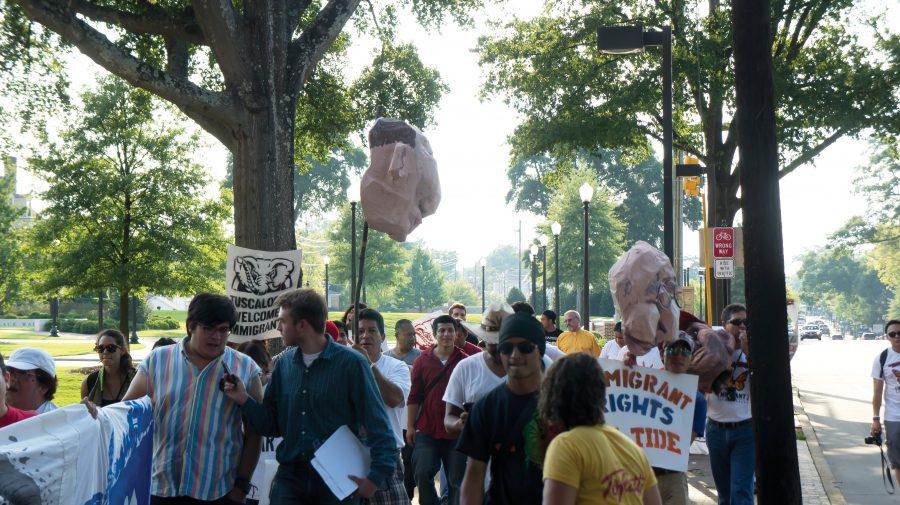A group of undocumented immigrants, students, immigration reform supporters and clergy marched down University Boulevard on Monday. The crowd was part of the “Undocubus Riding for Dignity,” a bus tour of people who are voluntarily coming out of the shadows and declaring themselves as undocumented.
The march started in front of the Federal Courthouse on University Boulevard and ended outside Foster Auditorium.
Julio Sanchez has been traveling around the country with the bus tour and is an undocumented immigrant. He has lived in the United States for nine years and strongly opposes new crackdowns on illegal immigration.
“We just want equality for everyone. We are fighting for no more HB 56, no more racial profiling, and are marching for the rights of the undocumented,” Sanchez said.
Through a translator, Jasper Juarez said he has lived in Tuscaloosa for nine years and is originally from Veracruz, Mexico. Also undocumented, Juarez said he is marching because he wants to make it clear to the community that undocumented immigrants will not tolerate any “racist” laws in Alabama.
Julia Mara is also an undocumented immigrant originally from Veracruz, Mexico. She now lives in Tuscaloosa and says the bus tour is lifting Alabama higher.
“I’m here defending our rights, rights that we all deserve, regardless of skin color,” Mara said. “This is a racist law that affects all Latinos, regardless of whatever country you come from.”
Mara also said immigrants want to come to the United States to work, and they are not assassins or murderers like they are sometimes portrayed.
Victor Palafox lives in Birmingham. He was born in Mexico City and came to the United States when he was six. He is now 20 and said he feels like an American.
Being an undocumented immigrant, Palafox is unable to attend college in Alabama. He was accepted into UAB, Auburn, Loyola and Springhill College, but he couldn’t attend because of his immigration status.
Palafox said his situation is not unique among youths in his community.
“One of the students that we work with got a full ride to Samford, yet when they found out his status, they took it away,” Palafox said.
Fred Hammond, the minister at the Unitarian Universalist Congregation of Tuscaloosa, was acting as a police liaison during the march.
Toward the end of the demonstration, campus police asked the protestors to move off of the Foster Auditorium plaza.
“What we were just told by the police here is that the city streets are public property and we could walk on the city streets, but we’re not allowed to be on the University property because the University is privately owned,” Hammond said.
The University has faced questions of abridging freedom of peaceful assembly before. In 2010, director of media relations Cathy Andreen said the University of Alabama attaches great value to freedom of speech and open debate, but it also attaches great importance to the principles of civility and respect that govern an academic community.
Despite the abridged nature of the assembly, Palafox is looking forward to the future.
“I’m definitely hopeful that things will change because the community is finally taking a stand and waking up,” Palafox said.







